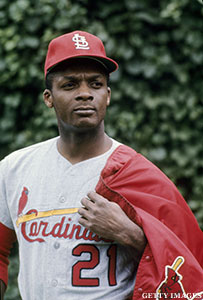
When Albert Pujols signs on the dotted line of a mega free agent contract this off-season, whether with the St. Louis Cardinals or another organization, he no doubt will thank his faith, family and agent.
Like every other hot commodity on the market, from Andy Messersmith in 1975 to Carl Crawford in 2010, Pujols also will owe a debt of gratitude to a former Cardinals all-star, Curt Flood.
The subject of an excellent new HBO documentary premiering Wednesday at 9 p.m. ET, Flood waged a court battle against baseball's monopolistic establishment in the late 1960s and early '70s. "The Curious Case of Curt Flood" compellingly examines the late Flood's fascinating, often tragic life, with his ill-fated legal challenge of the restrictive reserve clause serving as centerpiece.
Before watching the film, I knew only the children's book version of the Flood story. But the real tale is a complex one, and Flood was a complex hero. The film, narrated by Liev Schreiber, treats him accordingly by examining his many weaknesses in proportion to his celebrated strengths.
One of those strengths was playing baseball. At 5-foot-9, 165 pounds, Flood was slight of stature but a force on the field during his Cardinals career, which began in 1958 after a trade from the Cincinnati Reds. Flood generated some stellar offensive seasons, including 1967, when he hit .335. But he was most valuable as an acrobatic, rangy center fielder whose tremendous defense was rewarded with seven Gold Gloves.
During Flood's time in St. Louis, the Cardinals won three National League pennants and two World Series titles, yet perhaps his most memorable postseason moment was a misplayed fly ball in Game 7 of the 1968 Series that led to a Detroit Tigers victory.
That was Flood's life, a tinge of bitterness infringing upon nearly every success.

Flood faced down racism to rent a Bay Area house for his family in 1964; soon after, he split with his wife and wound up largely estranged from his children. Flood excelled at baseball, grew rich and lived the high life because of it; meanwhile his finances were a disaster. Most significantly, Flood took on the Major League Baseball ruling class, an act whose momentum soon helped bring about free agency. It just happened too late to benefit Flood.
The documentary traces Flood's life from his youth in Oakland through his baseball career, his post-career escape abroad and his return, ending with his death in 1997 of throat cancer.
The bulk of the focus shines on the lawsuit Flood filed in 1969 after the Cardinals traded him to the Philadelphia Phillies against his will. Because of the reserve clause, a feature in the uniform player’s contract at the time, Flood was bound to his team in perpetuity.
"In the history of man, there is no other profession except slavery where one man is tied to one owner for the rest of his life," Flood says in a clip played at the beginning of the film. "In slavery they ship you from one plantation to the other. In baseball they do the same thing – they ship you from one franchise to the other depending upon the whims of 24 millionaires."

In another clip shown later, Howard Cosell points out Flood’s $90,000 salary, which made him several times wealthier than the average American. "A well paid slave," Flood responds, "is nonetheless still a slave."
The film clearly explains Flood's motivations, the legal basis for the suit, its obstacles and its major participants. Former MLB Players Association officials Marvin Miller and Richard Moss provide some great insight, as do former teammate Bob Gibson, author Brad Snyder and Flood's second wife and widow, Judy Pace Flood.
The court battle effectively ended Flood's career, as he sat out the 1970 season after refusing to report to the Phillies. Faced with staggering financial troubles, he tried a comeback in 1971 after being dealt to the Senators. He lasted 13 lousy games and disappeared to Europe.
The case went to the Supreme Court without Flood, and although it failed, it served as catalyst for the wave that Pujols soon will ride deservedly to the bank.




